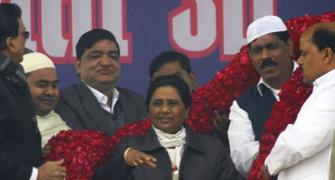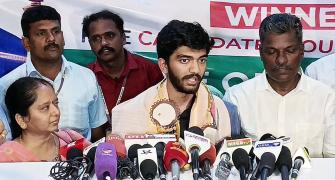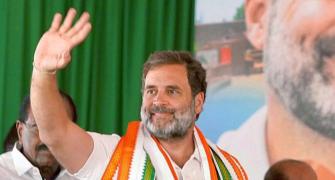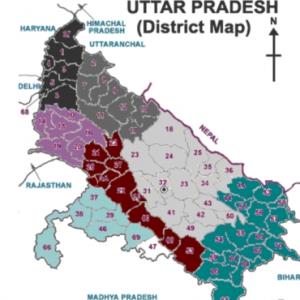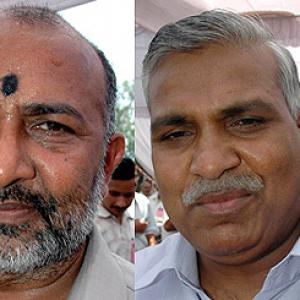Uttar Pradesh, unlike almost any other Indian state, is ruled and run on caste.
In some ways, caste is a bigger player in the state than either religion or national issues, says Lucknow native Faisal Kidwai.Uttar Pradesh, India's most populous state, is buzzing with political activity as it prepares for the all-important state election in February.
Although there are four big political parties in the fray, realistically speaking only two, the Bahujan Samaj Party and the Samajwadi Party, are in a position to take a shot at the top prize.
Out of the other two, the Congress and Bharatiya Janata Party, the former is expected to cut into the BSP's votes and post a better result compared to its dismal performance in the last assembly election, while the latter is projected to watch the game from the fourth position.
Mayawati, the current chief minister and BSP leader, is gearing up for a fight against her arch enemy, Mulayam Singh Yadav, the leader of the Samajwadi Party.
Political leaders are known for having an inflated ego, for being narcissistic and for being ruthlessly ambitious.
When it comes to narcissism, no leader comes close to Mayawati.
While nearly every Indian state is moving ahead, UP has a per capita income that is one of the lowest in the country; half its population lives below the poverty line; the life expectancy of women is just 55 years; the under-five mortality rate is 144 per 1,000, which is similar to sub-Saharan Africa; and only one out of four seven-plus years old girls/women can read and write.
And what is Mayawati, who has been the chief minister for four terms, doing to improve the sorry state?
When she is not busy transferring and re-transferring government officials, Dear Sister Mayawati -- that is how she is referred to on posters that are plastered all over the state -- has apparently spent more time on building parks and memorials than on improving the state's finances.
She has wasted more than Rs 3,000 (Rs 30 billion) on six parks and memorials like the B R Ambedkar Samajik Parivartan Sthal and the Manyavar Kanshiram Smarak Sthal in Lucknow, the state capital, and in Noida, the state's financial powerhouse.
That cost does not include maintenance.
A state that cannot provide uninterrupted electricity even in its capital Lucknow, a state where garbage rots on the streets and where the sight of municipal staff actually working is truly rare, the parks and memorials are well-lit, clean and exceptionally well-maintained.
In February 2010, Mayawati's government approved a plan for a special police force to protect the statues.
She feared that her political opponents might demolish the statues.
She claims that the expenditure on statues and symbols of Dalit icons was required because past governments did not show respect towards Dalit leaders, in whose memory nothing was ever built.
But the question is: How are you paying homage to Dalit leaders by installing life-size statues of yourself?
I suspect it has more to do with narcissism than respect.
Secondly, how is building statues going to benefit the poor?
I am pretty sure the Dalits would have been happy, and would have thanked her for generations, if she had spent the same money on schools, hospitals and other basic services.
That would have not only benefited the poor, but also improved the state's health, which is in a critical situation.
So, people do not have schools, hospitals, jobs, electricity and clean water, but have sprawling and swanky parks.
But that is not all. She has spent more than Rs 70 crore (Rs 700 million) on her bungalow, which sprawls over a 200,000 square feet compound in a posh area of Lucknow.
She has installed an 18-feet statue of herself, which stands under a marble canopy next to that of her mentor Kanshi Ram, according to media reports.
She has more than 50 cars in her security cavalcade, including 15 specially modified vehicles, and the total cost of these runs into many million rupees.
As if wasting so much public money wasn't enough, she had once sent a plane to Mumbai just to fetch her favourite pair of shoes, according to the whistle-blower Web site WikiLeaks.
And if you think this is the end of her money-spending spree, think again.
The state has no big industry, the infrastructure is in ruins and corruption is at an all-time high, but Mayawati is expected to win a fifth term as chief minister.
The reasons why she is expected to bring her party back into power has to do a lot with the personality cult she has built around her, but also with the state's caste equation.
UP, unlike almost any other Indian state, is ruled and run on caste. There are more than 60 castes in the state and all compete with each other for political patronage and benefits.
In some ways, caste is a bigger player in the state than either religion or national issues.
Leaders like Mulayam and Mayawati know the caste game well and that is why they go out of their way not only in fielding a candidate based on caste factors, but also in giving sops and jobs to those caste groups that are more likely to vote for them.
Mulayam, the only real contender to Mayawati, could once bank upon the Yadavs, the Muslim community and those Brahmins who were opposed to Mayawati, but the big rise in crime and misgovernance during his rule forced the business community and Muslims to dump him.
Mulayam is again trying to bring back Brahmins, Muslims and Thakurs into his fold, but with Mayawati maintaining a stranglehold on the state and, more importantly, with a much bigger war chest than Mulayam, things look pretty positive for her.
So, get ready for another sprawling park with life-size statues of her, more additions to her fleet of cars and another round of expenditure on everything from shoes to bungalows to food tasters.

